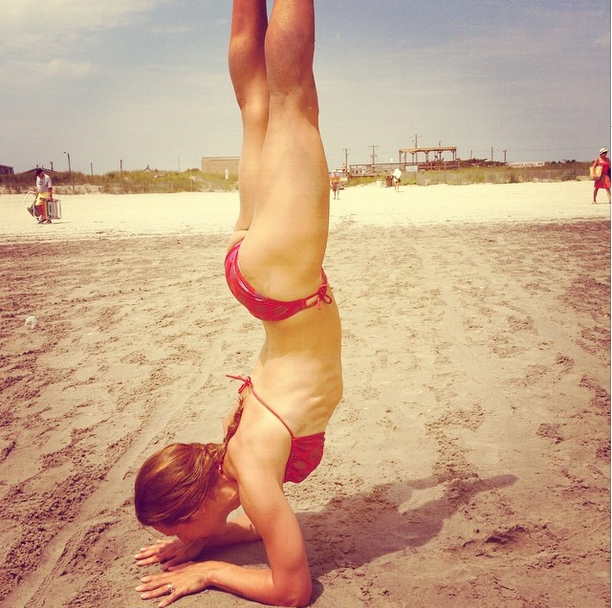 There’s a special Hell for people who bring tuna or egg salad sandwiches on airplanes.
There’s a special Hell for people who bring tuna or egg salad sandwiches on airplanes.
I was sending malevolent thoughts at the man across the aisle from me munching on a particularly pungent tuna sandwich when the signal dinged for all of us to fasten our seat-belts. I was halfway on my journey home from visiting friends in Indianapolis. We were, according to the captain, about to land in Chicago.
It had been a particularly painful trip. It was 2005, and I was battling a lot of personal demons that included a painful breakup and a variety of body image issues. My mother and I weren’t speaking and I was in a huge fight with my best girlfriend. Depression had bestowed me with my worst writer’s block yet. In other words, I had yet to find my peaceful dumpling self.
I turned away from my smelly nemesis and stared out the window. I breathed in and out. I had hoped a visit with friends would cheer me up. Instead, it made leaving for California all the more painful. I felt so alone.
“Prepare for landing,” the captain ordered, using that commanding yet kind inflection only captains seem to possess.
Then the plane emitted one of the most horrific sounds I’ve ever heard from something non-human. Until then, I didn’t know a machine could sound like it was in pain. What started as a long wail mixed with fingers on chalkboard turned into a grinding noise. The floor began to shake.
I glanced at my seat partner, a middle-aged mom who had told me all about how well her son Jason was doing at his new school for the arts. We stared at one another, and I wondered if my face was as white as hers.
It was a very upsetting sound.
A bell dinged. A stewardess, tense, walked briskly up the aisle. People, some timid, some with voices more than strained, asked her what was going on, and she sternly told us “one minute.”
What was one minute felt like ten.
“We’re not descending,” my neighbor said. “We’re just circling.”
I nodded. I wasn’t sure what that meant. I mean, we weren’t crashing. Obviously the captain was in control of the plane. Things couldn’t be that bad.
The captain’s voice, still calm, once again came over the intercom. As briefly and confidently as possible, the captain informed us that the airplane wheels, while descending, had become stuck at 45-degree angles. That was the sound we had heard. They were in talks with air traffic control, and we weren’t to worry. We’d land.
Frankly, landing sounded exactly like what we should have been worried about.
I have to hand it to the flight attendants: they remained completely calm. They smiled as they went to each individual row to check in on everyone. Their calm was infectious. While I wouldn’t say the passengers were jubilant, we remained relatively at ease. Though when I needed to use the ladies’ room I did notice that the “fasten seat belt” sign was still illuminated.
From our seats in the sky, we watched the sun set.
My neighbor talked more about her son. The man across the aisle asked a flight attendant to throw away his sandwich. There was a camaraderie, the kind I imagine infiltrates those who enlist as they head towards war.
After about half an hour of flying in circles, the grinding noise began again. Before we could panic, the captain spoke.
“We’re going to try to land. Please assume brace positions.”
Suddenly, the flight attendants, all brusque and business and no longer smiling but not exactly panicked, demonstrated for us the “brace” position. Our feet were to remain flat on the floor. Our hands at our side or crossed across our chests. Our head against the seat in front of us.
We were descending. The airplane took on a new form of quiet.
I glanced out the window. And that’s when I saw the airport below us. That’s when I took in the fact that the runway was foamed, and that the fifty or so emergency vehicles with flashing lights were there for us. Everyone was waiting for us to crash.
“Brace for landing.”
Only then did I realize we were in honest-to-God danger. You don’t foam a runway for nothing. You don’t call out a million ambulances because you expect everyone to be okay.
Our descent speed increased. The grinding of the stuck wheels, still trying to free themselves, grew louder.
Next to me, tears silently leaked from the mother’s eyes. I reached over and squeezed her knee.
I thought about my own mother, and how I loved her. I considered my week, and shook my head. I’d been fretting about stupid stuff that didn’t really matter. I thought about my friends, and the fact that I hadn’t published The Great American Novel.
If we land safely, I told myself, I’d call my mother. I’d call my best girlfriend. I’d make things right.
I wasn’t scared. By that point any feelings of terror were dulled by shock. Instead, I felt a strange sense of peace. What was going to happen was going to happen. Today I can most closely relate that feeling to that of being at the top of a roller coaster. I’m terrified of the rides, but I always go on them. Just before it begins, as the coaster teeters at the highest brink, I give myself up to whatever may or may not be watching over us. That’s how I felt as we landed. What was going to happen was going to happen, and there was nothing I could do about it.
I had so much love to give.
I was thinking this thought as the grinding suddenly grew into a pure cacophony of chaos…. And then, quiet. All you could hear was the breathing of 300-plus scared passengers.
“Wheels are down. Wheels are down,” the captain barked over the intercom. He wasn’t able to keep the relief out of his voice. Everyone burst into applause. At the front of the plane, two flight attendants high-fived.
We landed eighty seconds later.
“I can’t wait to tell Jason,” the mother said to me as we bounced to a stop. I’d never been more thankful for the feeling of wheels in my life.
“I can’t wait to call my mom,” I replied. Only I knew this story would scare her to death.
When the “fasten seat belt” sign finally turned off, my row stood up and hugged one another. I no longer hated the tuna eater.
Not everyone’s “near death” experience has a happy ending. I was lucky. I’d like to say that after that, I stopped wasting my time crying over loser boys. That I stopped worrying about my looks. That fresh prose came every morning and my priorities changed overnight. But that would be a lie. Yet when times are really tough, when I want to do nothing more than sink into a hole in the ground and disappear, I remember that once upon a time I nearly did just that, thousands of feet in the air. Then I look up at the sky, assign each cloud a shape, and continue walking, head held high, hopes and dreams– even higher.
Also by Emily: The Book List: Reading for Your Soul
How I Overcame My Fear of Heights and Climbed a Mountain
Thoughtful essays on life and love on Voices
____
Photo: atomtigerzoo via Flickr




